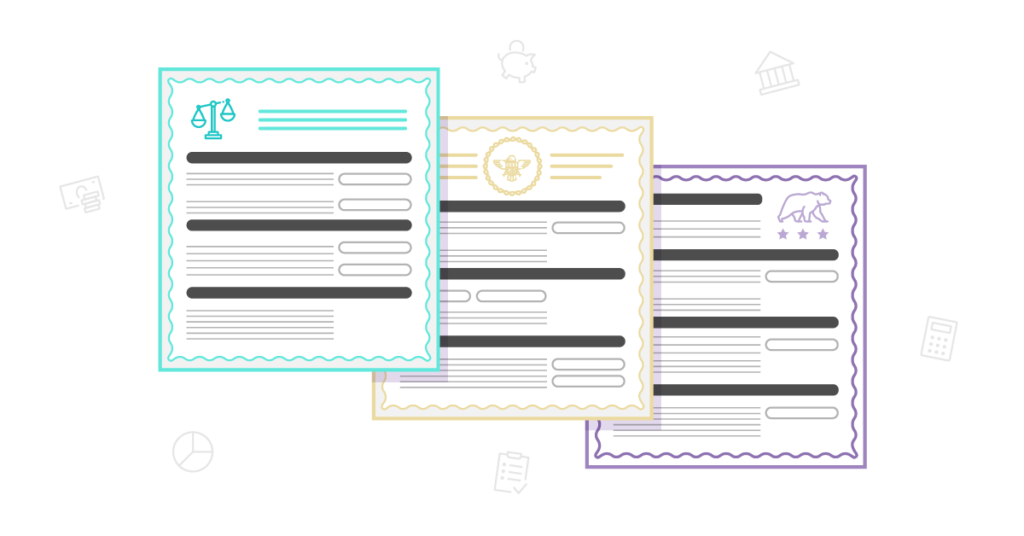There are tons of ecommerce business models, but many involve buying products from a wholesaler or other retailer and reselling those items at a higher price, then rinse and repeat.
If you buy your inventory from vendors, chances are you’ll be charged sales tax unless you hold a valid “resale certificate” (sometimes called a “reseller’s permit.”)
Resale certificates prove to your vendor that you are buying their products to sell rather than to use yourself, and so your purchase isn’t subject to sales tax.
But as with anything sales tax related, there’s a bit more to it than just showing up on your vendor’s doorstep (brick and mortar or virtual) and presenting them with a piece of paper.
This guide will help you properly use and accept resale certificates.
Resale Certificates 101
First, keep in mind that sales tax is governed at the state level, and that means each state’s rules and regulations around resale certificates will be slightly different. This article with provide you with general rules of thumb, but you should check with your state or a vetted sales tax expert for resale certificate rules specific to your business case.
In most cases, a resale certificate isn’t a specific piece of paper at all. Though some states will issue an actual piece of paper, the real purpose of a resale certificate is just to make sure your vendor has all the information they need about you to legally not charge you sales tax. For that reason, you can generally print off blank resale certificates online, or even buy blank pads of resale certificates at an office supply store. Try searching “your state + resale certificate.”
To use a resale certificate, you need to be registered to collect sales tax in a state. Depending on the state, this is also referred to as holding a “sales tax permit” or “sales tax license.” In most states, the number you receive when you register for a sales tax permit doubles as your resale certificate number, though some states will issue you a separate resale certificate number.
Using a Resale Certificate
It’s important to note that states issue very specific rules about how to use resale certificates. In general, you can only use a resale certificate to avoid paying sales tax when purchasing either items you intend to sell or lease, or component parts of items you intend to sell or lease. Any other use of a resale certificate – such as buying coffee and printer paper for your office – is consider unlawful.
When presenting your resale certificate to your vendor you’ll generally be asked to provide the following information:
- Your name/business name
- Sales tax permit/reseller’s permit number
- Your name, address and telephone number
- The type of business you are in
- A description of the property bought for resale
- Your signature verifying the purchase is lawful
Keep in mind that vendors reserve the right to accept your resale certificate. They can have any number of reasons for this. For example, Target is famous in reseller circles for trying to prevent resellers from buying exclusive Target products and reselling them. Another reason your vendor may not accept your resale certificate is that vendors are usually on the hook for any unpaid sales tax should the transaction turn out to have been taxable.
If you are required to pay sales tax when buying items you intend to resale, some states allow you to recover the sales tax you paid.
If you buy an item tax free and decide later to keep and use that item, you are required to pay the “use tax” on that purchase. Most states have a line item on their sales tax filings that allows you to remit any use tax due.
Using Resale Certificates Across State Lines
Forty-five U.S. states and Washington D.C. have a sales tax, and thirty-six of those states allow vendors to accept resale certificates issued out of state. But ten states only allow vendors to sell to buyers tax free if they present an in-state resale certificate. Those ten states are:
- Alabama
- California
- Florida
- Hawaii
- Illinois
- Louisiana
- Maryland
- Massachusetts
- Washington
- Washington D.C.
To get around these, you can either pay the sales tax (and try to recover it later) or register for a sales tax permit in the state. Do keep in mind, however, that if you register for a sales tax permit you are also required to collect sales tax from all of your buyers in that state.
Accepting a Resale Certificate
Over the course of your business, you may have customers who present you with a resale certificate. If this is the case, you should be sure to do the following:
- Be sure the resale certificate is completely filled out by your customer – This is to protect you in case of an audit. Many states hold sellers, not buyers, accountable for the unpaid sales tax if there’s something irregular about the resale certificate.
- Verify that your buyer’s sales tax registration is valid – Make sure your buyer’s resale certificate number is valid and not expired. You can verify a resale certificate online in most states.
- Make a “good faith effort” to determine that the purchase is valid – Many states hold vendors accountable if a buyer’s resale certificate turns out to be invalid, but they generally also take into account if a vendor made a “good faith effort” to verify the validity of a purchase. For example, say your buyer lists on their resale certificate that they own a pool & spa store, and they claim they want to buy a refrigerator from you to resell in their store. Something is fishy there, and you are within your rights to refuse to make the sale.
- Keep the resale certificate on file – Again, you’ll want all the information about the buyer and the purchase on hand in the event of an audit.
I hope this post has helped demystify resale certificates for you. You can read more about using resale certificates in each state here, or ask questions in the comments!
TaxJar is a service that makes sales tax reporting and filing simple for more than 10,000 online sellers. Try a 30-day-free trial of TaxJar today and eliminate sales tax compliance headaches from your life!



